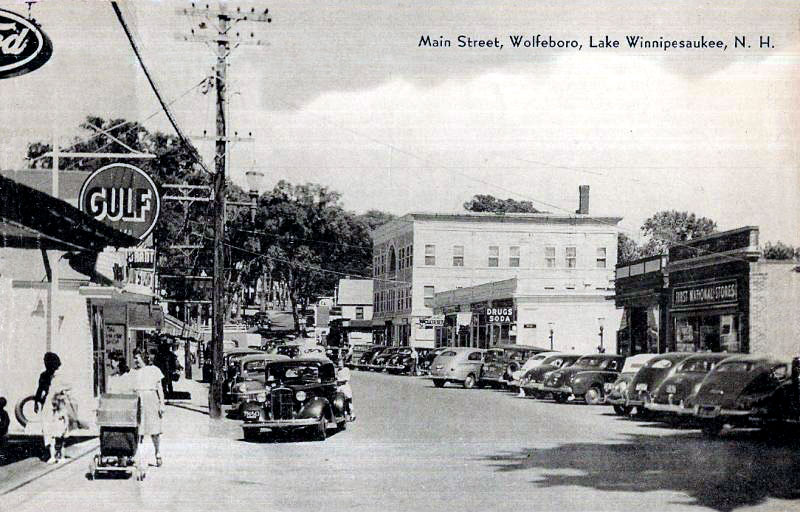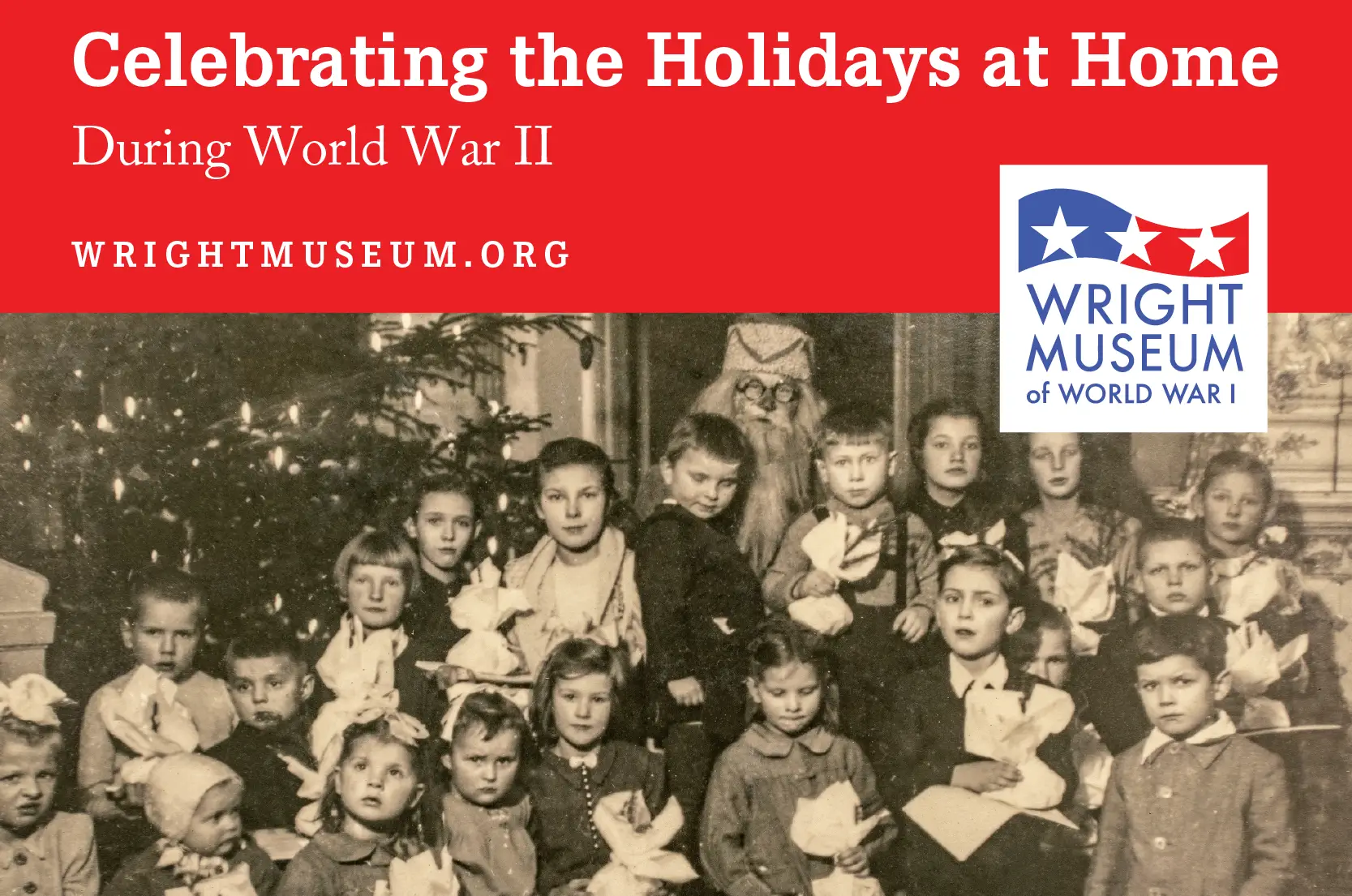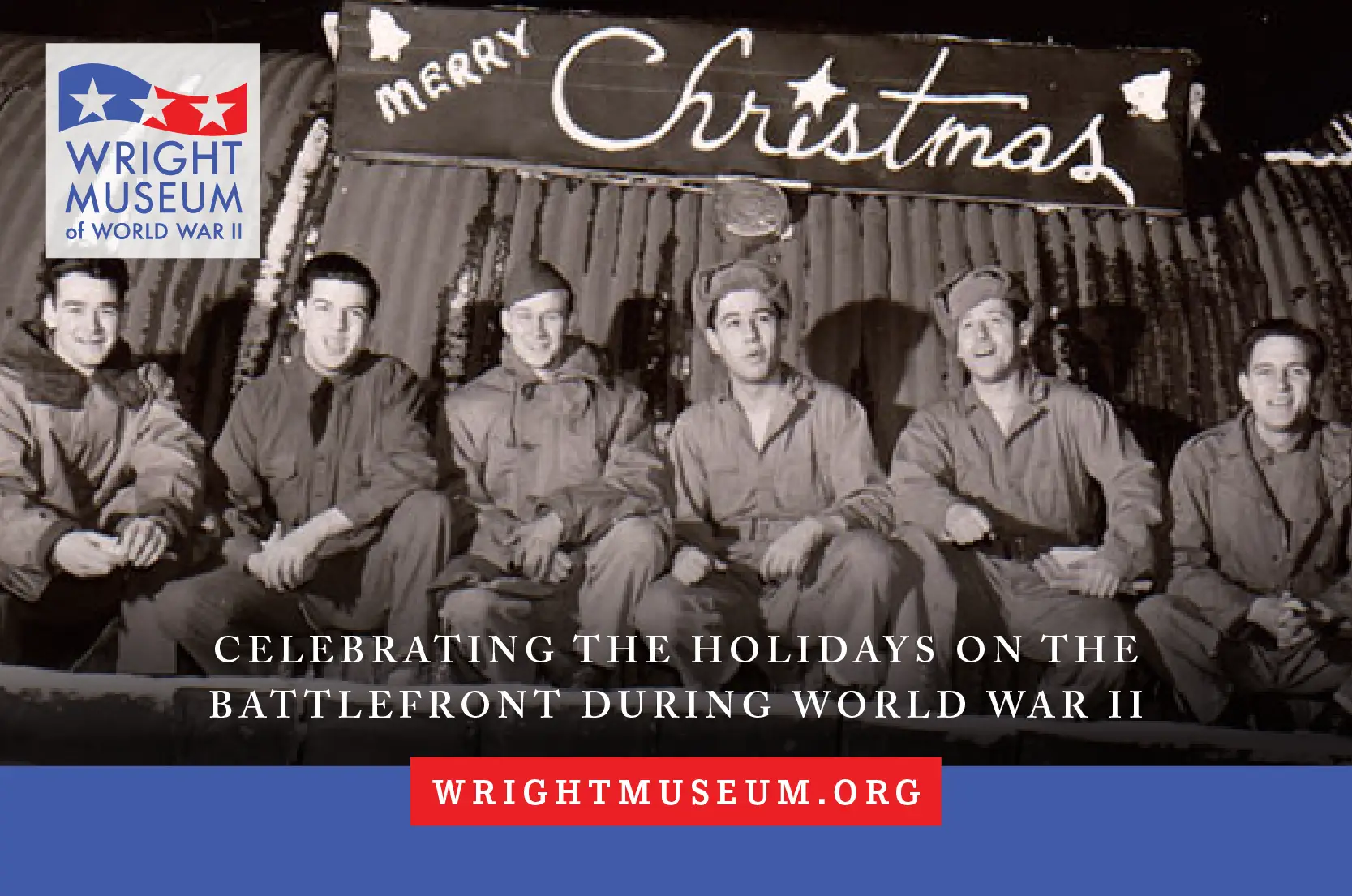Wolfeboro was incorporated as a town in 1770 and over the years became a popular summer vacation destination for people from all over the United States. During World War II, Wolfeboro’s husbands, wives, sons, and daughters left home to serve in the military.
Have you ever wondered what it was like to live or vacation in Wolfeboro during the war? Here are some snippets from local newspapers that will give you an idea:
1942
- January 21 – Dr. Nathaniel Harvey Scott of Dalton, NH, who will be 91 years old in March, was refused insurance as a young man of 24 because of a tubercular condition. He is the oldest living member of the Wolfeboro Congregational Church and has been engaged in the practice of medicine since his graduation from Bowdoin Medical College in 1874.
- April 10 – Reverend Orman T. Headley, pastor of the First Christian Church of Wolfeboro announced that he is breaking all ties with the New Hampshire Congregational Conference because they are failing to back the U.S. war effort. He mentioned two failures. First, the New Hampshire Congregational Record appealed for money to support “slackers” and conscientious objectors in church internment camps. And, second, in 1940, the New Hampshire State Conference of Congregational-Christian Churches refused to adopt a resolution expressing sympathy with the conquered and oppressed people of Europe.
- May 2 – Wolfeboro plans to use summer residents whenever possible for Civil Defense activities.

- September 14 – Walter L. Hale received a message from the War Department Saturday night that his son, Lieutenant Clayton E. Hale, of the U.S. Army Air Forces, had been killed in active duty September 10. This was Wolfeboro’s first war casualty. The 24-year-old flyer had been in the air corps since April 28, 1941, and was last heard from in India. He graduated from Brewster Academy in 1937 and from Boston University in 1941.
- September 15 – Mr. and Mrs. Laurence S Heely have returned to their home in Irving, Pl., after a fortnight at Wolfeboro, N.H. as guests of Mr. and Mrs. Malbone Blodgett of Greenwich, Conn., whose summer home is at Wolfeboro.
- November 20 – A dairy barn and 25 cows were destroyed by fire today on the farm of Mrs. Nathaniel B Brewster.
1943
- January 20 – Ralph Bellows of Clarksburg has accepted a call of the Advent Christian Church at Wolfeboro, N.H.
- May 1 – Robert F. Thurrell, president of the Northeastern Poultry Council of East Wolfeboro, N.H., told a congressional committee here today 75 per cent of the country’s poultry is going to the black market. He blamed OPA officials and warned against a possible black market in eggs which would make the poultry corner “seem like a piker.” The U.S. Army was unable to buy poultry for the last three months because the black market “has been so vicious,” he said.
- May 20 – Milton J. Seeley died today in Huggins Memorial Hospital. Seeley trained dogs for Admiral Richard E. Byrd’s Antarctic expeditions. At the time of his death, Seeley was assembling and training huskies for the government.
- November 16 – The State Salvage Division announced today that Governor Blood presented special certificates to the city of Portsmouth and the towns of Wolfeboro and Newbury for leading the state in the collection of fats salvage collections during September.
1944
- March 25 – The flier who was injured yesterday when a British plane landed on the ice of Lake Winnipesaukee was reported as resting comfortably today at Wolfeboro hospital. The pilot and only other occupant was not hurt.
- May 23 – The war finally caught up with the ice fishermen. They used to drag their fishing shacks several miles out onto the ice of Lake Winnipesaukee by car. Now the gas shortage forced them to set up their shacks within walking distance of the shore.
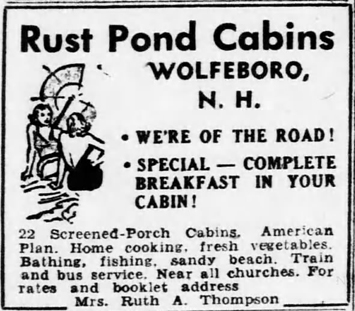
- October 9 – Mrs. Elizabeth of Wolfeboro NH accepted the position as the new principal of the Mitchell School in Kittery Point, Maine.
1945
- May 24 – More than 150 persons were searching today for five-year-old Billy Lord, reported missing from his Wolfeboro Falls home early last night. Billy’s parents, Mr. and Mrs. Charles Lord, said the missing youngster was last seen playing with his six brothers and sisters in the family yard about 6:30 p.m. Charles Lord, an Okinawa veteran, is on leave for 15 days.
- May 25 – Billy Lord was found wandering several miles from his Wolfeboro Falls home. He had been missing for 29 hours. Two Brewster Academy students were rewarded $25 War Bonds by the American Legion for finding Billy on Poor Farm Hill.
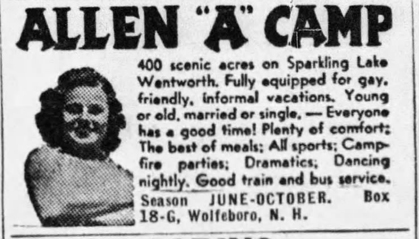
- July 24 – Ed Payne, creator of the famous comic strip ‘Billy the Boy Artist’ which for years has appeared in the Boston Sunday Globe, will be the featured artist at an open-air gathering at the Allen A Camps here tomorrow. Payne will give one of his celebrated chalk talks for the benefit of the Summer residents and their guests.
- August 7 – The skeleton of an Indian woman who died more than a century ago has been found on the shore of Lake Winnipesaukee near Melvin Village.
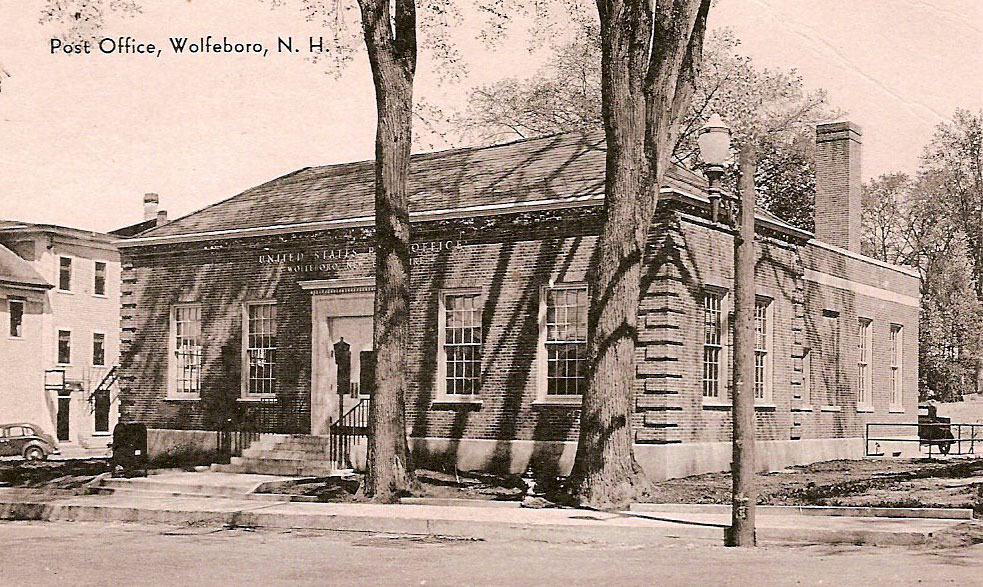
Changes in Town Life
Before the war, tourism in Wolfeboro was flying high. Even 1942 was satisfactory for just about everyone, tourists using any form of transportation except the automobile. The summers of 1943 and 1944, however, were slow with virtually no power boating on the lake. There were tourists in town but the entire industry was in low gear due to shortages of gasoline and tires, men being in the service, and other aspects related to the war effort.
Brewster Academy’s Brown Hall became headquarters of the Wolfeboro Civilian Defense Committee. Carpenter School, the post office, and the Masonic Temple were set up as potential hospitals in case of enemy attack. Pictures of aircraft were published so that townspeople could tell the difference between U.S. and enemy planes. Soon teams of aircraft spotters were stationed around town.
Wolfeboro citizens planted Victory Gardens, some on free land offered by the town. The Quick Freeze Locker Service opened on Railroad Avenue. Garden-fresh produce was stored in refrigerated drawers and withdrawn at will.
Throughout the war, a large flag was stretched over South Main Street in Wolfeboro. It displayed a gold star with the number of Wolfeboro military deaths recorded below it, and a blue star with the number of Wolfeboro people in service. By war’s end, the totals had increased to 14 gold stars and 293 blue stars. Like virtually every town and city across the United States, Wolfeboro experience dramatic but necessary changes as a result of the World War II effort.
*News stories are directly quoted from contemporary newspapers. Additional information was gathered fromThe History of Wolfeboro (1996) by David Bowers. Visit the Museum to learn more about life in Wolfeboro and New Hampshire during WWII.

